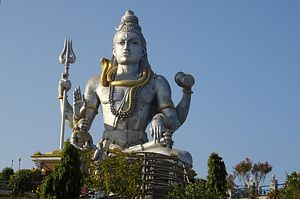A new religion has the possibility of being added to India’s official roster of existing and practicing religions. The state government of Karnataka has granted a separate religion tag to the Lingayats, who make up to 17 percent of the population of the southern state.
Following the recommendations of a committee constituted especially to look into the matter, the government of Karnataka now awaits the approval of the Central government. But is this move a moment where nearly 40 million voices are finally being given their due, or is this a strategic move ahead of the elections in Karnataka in a couple of months?
Lingayats are currently classified as a Hindu subcaste called “Veerashaiva Lingayats,” even though the community evolved from a 12th century movement led by the philosopher-saint Basavanna to help downtrodden sections of Hindu society break the chains of caste.
According to NG Mahadevappa, a Lingayat scholar and retired professor of philosophy at Karnatak University, the Lingayat religion is separate from Hinduism. “The Lingayats are strict monotheists. They enjoin the worship of only one God, namely, Linga (Shiva). It must be noted that the word ‘Linga’ here does not mean Linga established in temples, but universal consciousness qualified by the universal energy (Shakti),” he wrote in his book Lingayatism: An Independent Religion.
SM Jamdar, a retired bureaucrat from Karnataka, who has been among the strongest advocates of this cause, states that it is the only religion that openly rejects idol worship and the rituals that are associated with Hinduism.
There are 15 million in Maharashtra, 10 million in Karnataka, 8 million in Telangana, and 5 million in Tamil Nadu who associate themselves with the Lingayat religion. There are nearly 3,000 religious monasteries of the community, which run hundreds of schools and colleges in Karnataka, and the need for the separate status is geared toward maintaining the teachings of Basavanna, lest they get subsumed within the Veerashaiva and Hindu nomenclature.
The Lingayats in Maharashtra have been demanding a similar separate minority religion status since 2014. Jamdar takes a leaf from the 1955 Hindu Marriage Act and the 1956 Hindu Succession Act to justify the call for the minority religion status: “Lingayats, Buddhists, Jains and Sikhs are included among Hindus, but Buddhists, Sikhs and Jains have been identified by state and central governments as minority religions. Only Lingayats remain.” Once so recognized, the Lingayats would be able to avail benefits of freedom of religion and rights of minorities under the Indian Constitution.
There have been several signature campaigns in the past toward this end. However, the movement gained momentum last year in July, when a wave of gatherings of thousands of people became visible, towards pressuring the Indian National Congress, which is in power in Karnataka.
Lingayats are traditionally considered to be supporters of the Bharatiya Janata Party (BJP), which has, since 2014, emerged as the ruling party in most states across India. Political analysts and the opposition have accused the opposition Congress Party of playing up the issue for electoral gains.
Karnataka Chief Minister Siddaramaiah has ordered pictures of Basavanna to be put up in all government offices. Some ministers within Congress have opposed the appeasement to the Lingayats. On the other hand, the official Twitter handle of BJP in Karnataka likened Siddaramaiah to the Mughals and the British for playing divisive politics and called him the most “virulent” chief minister.
It is interesting to note that journalist Gauri Lankesh and academician MM Kalburgi had both supported the movement for Lingayat to be a separate religion. Both residents of Karnataka, Lankesh and Kalburgi were shot at point blank range in front of their houses by bike-borne assailants, two years apart, for questioning the rise of religious intolerance in the state.
Between the time when the Central government may issue its verdict, and the polls in May, it is evident once again how religion and the ensuing divisive politics continue to be used as an election prop in India.

































